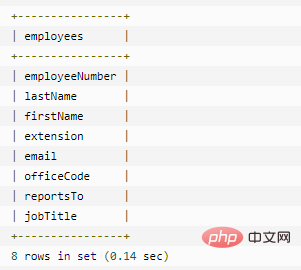Can mysql create a joint index?
mysql can create joint indexes. MySQL allows users to create a joint index containing up to 16 columns. There are two creation methods: 1. Create when creating a table, the syntax "CREATE TABLE table name (column name 1 type PRIMARY KEY, column name 2 type, column name 3 type, ...INDEX index name (column name 2, column name 3...));"; 2. Create when modifying the table, the syntax "CREATE INDEX index name ON table name (column name 2, column name 3, column name 4 );".

The operating environment of this tutorial: windows7 system, mysql8 version, Dell G3 computer.
What is a joint index? The essence of a joint index: The leftmost matching
The index on two or more columns is called a joint index, and the joint index is also called a composite index. MySQL allows users to create a composite index containing up to 16 columns.
For composite indexes: Mysql uses the fields in the index from left to right. A query can only use part of the index, but only the leftmost part.
For example, the index is key index (a,b,c). It can support 3 combinations of a | a,b| a,b,c for search, but does not support b,c Perform a search. Indexes are efficient when the leftmost field is a constant reference.
The query optimizer uses composite indexes for queries that test all columns in the index, or queries that test the first column, the first two columns, etc.
A single composite index can speed up these types of queries on the same table if the columns are specified in the correct order in the index definition.
Create a joint index when creating a table
Syntax:
CREATE TABLE 表名 (
c1 data_type PRIMARY KEY,
c2 data_type,
c3 data_type,
c4 data_type,
INDEX 索引名 (c2,c3,c4)
);In this syntax, the joint index consists of three columns c2, c3 and c4.
Create a composite index when modifying the table
You can use the following CREATE INDEX statement to add a composite index to an existing table:
CREATE INDEX 索引名 ON 表名(c2,c3,c4);
Please note that if You have a composite index on (c1, c2, c3), you would index the search function on one of the following combinations:
(c1) (c1,c2) (c1,c2,c3)
For example:
SELECT
*
FROM
table_name
WHERE
c1 = v1;
SELECT
*
FROM
table_name
WHERE
c1 = v1 AND
c2 = v2;
SELECT
*
FROM
table_name
WHERE
c1 = v1 AND
c2 = v2 AND
c3 = v3;If the columns do not form an index 's leftmost prefix, the query optimizer cannot use the index to perform a lookup. For example, the following query cannot be found using composites:
SELECT
*
FROM
table_name
WHERE
c1 = v1 AND
c3 = v3;MySQL Union Index Example
We will demonstrate using the employees table from the sample database .

The following statement creates a joint index on the lastName and firstName columns:
CREATE INDEX name ON employees(lastName, firstName);
First, the name index can be used to specify the lastName value. lookup in the query because the lastName column is the leftmost prefix of the index.
Secondly, the name index can be used to query the value of a combination of lastName and firstName values.
The name index is used to find in the following queries:
1) Find the employee with the last name Patterson
SELECT
firstName,
lastName,
email
FROM
employees
WHERE
lastName = 'Patterson';This query uses the name index because The leftmost prefix of the index (i.e. the lastName column) is used for lookups.
You can verify this by adding a clause to the query via EXPLAIN:
EXPLAIN SELECT
firstName,
lastName,
email
FROM
employees
WHERE
lastName = 'Patterson';Here is the output:

2) Find Employees with last name Patterson and first name Steve:
SELECT
firstName,
lastName,
email
FROM
employees
WHERE
lastName = 'Patterson' AND
firstName = 'Steve';In this query, both lastName and firstName columns are used for the lookup, therefore, it uses the name index.
Let’s check it out:
EXPLAIN SELECT
firstName,
lastName,
email
FROM
employees
WHERE
lastName = 'Patterson' AND
firstName = 'Steve';The output is:

3) Find employees whose surname is Patterson and whose first name is Steve or Mary:
SELECT
firstName,
lastName,
email
FROM
employees
WHERE
lastName = 'Patterson' AND
(firstName = 'Steve' OR
firstName = 'Mary');This query is similar to the second query, where both lastName and firstName columns are used for the lookup.
The following statement verifies index usage:
EXPLAIN SELECT
firstName,
lastName,
email
FROM
employees
WHERE
lastName = 'Patterson' AND
(firstName = 'Steve' OR
firstName = 'Mary');The output is:
The query optimizer cannot use the name index for lookups in the following query , because only the column whose firstName is not the leftmost prefix of the index is used:
SELECT
firstName,
lastName,
email
FROM
employees
WHERE
firstName = 'Leslie';Similarly, the query optimizer cannot use the name index for the lookup in the following query because the firstName or lastName column is used for the lookup.
SELECT
firstName,
lastName,
email
FROM
employees
WHERE
firstName = 'Anthony' OR
lastName = 'Steve';[Related recommendations: mysql video tutorial]
The above is the detailed content of Can mysql create a joint index?. For more information, please follow other related articles on the PHP Chinese website!

Hot AI Tools

Undresser.AI Undress
AI-powered app for creating realistic nude photos

AI Clothes Remover
Online AI tool for removing clothes from photos.

Undress AI Tool
Undress images for free

Clothoff.io
AI clothes remover

Video Face Swap
Swap faces in any video effortlessly with our completely free AI face swap tool!

Hot Article

Hot Tools

Notepad++7.3.1
Easy-to-use and free code editor

SublimeText3 Chinese version
Chinese version, very easy to use

Zend Studio 13.0.1
Powerful PHP integrated development environment

Dreamweaver CS6
Visual web development tools

SublimeText3 Mac version
God-level code editing software (SublimeText3)

Hot Topics
 1393
1393
 52
52
 37
37
 110
110
 How to open phpmyadmin
Apr 10, 2025 pm 10:51 PM
How to open phpmyadmin
Apr 10, 2025 pm 10:51 PM
You can open phpMyAdmin through the following steps: 1. Log in to the website control panel; 2. Find and click the phpMyAdmin icon; 3. Enter MySQL credentials; 4. Click "Login".
 MySQL: An Introduction to the World's Most Popular Database
Apr 12, 2025 am 12:18 AM
MySQL: An Introduction to the World's Most Popular Database
Apr 12, 2025 am 12:18 AM
MySQL is an open source relational database management system, mainly used to store and retrieve data quickly and reliably. Its working principle includes client requests, query resolution, execution of queries and return results. Examples of usage include creating tables, inserting and querying data, and advanced features such as JOIN operations. Common errors involve SQL syntax, data types, and permissions, and optimization suggestions include the use of indexes, optimized queries, and partitioning of tables.
 How to use single threaded redis
Apr 10, 2025 pm 07:12 PM
How to use single threaded redis
Apr 10, 2025 pm 07:12 PM
Redis uses a single threaded architecture to provide high performance, simplicity, and consistency. It utilizes I/O multiplexing, event loops, non-blocking I/O, and shared memory to improve concurrency, but with limitations of concurrency limitations, single point of failure, and unsuitable for write-intensive workloads.
 MySQL's Place: Databases and Programming
Apr 13, 2025 am 12:18 AM
MySQL's Place: Databases and Programming
Apr 13, 2025 am 12:18 AM
MySQL's position in databases and programming is very important. It is an open source relational database management system that is widely used in various application scenarios. 1) MySQL provides efficient data storage, organization and retrieval functions, supporting Web, mobile and enterprise-level systems. 2) It uses a client-server architecture, supports multiple storage engines and index optimization. 3) Basic usages include creating tables and inserting data, and advanced usages involve multi-table JOINs and complex queries. 4) Frequently asked questions such as SQL syntax errors and performance issues can be debugged through the EXPLAIN command and slow query log. 5) Performance optimization methods include rational use of indexes, optimized query and use of caches. Best practices include using transactions and PreparedStatemen
 Why Use MySQL? Benefits and Advantages
Apr 12, 2025 am 12:17 AM
Why Use MySQL? Benefits and Advantages
Apr 12, 2025 am 12:17 AM
MySQL is chosen for its performance, reliability, ease of use, and community support. 1.MySQL provides efficient data storage and retrieval functions, supporting multiple data types and advanced query operations. 2. Adopt client-server architecture and multiple storage engines to support transaction and query optimization. 3. Easy to use, supports a variety of operating systems and programming languages. 4. Have strong community support and provide rich resources and solutions.
 How to connect to the database of apache
Apr 13, 2025 pm 01:03 PM
How to connect to the database of apache
Apr 13, 2025 pm 01:03 PM
Apache connects to a database requires the following steps: Install the database driver. Configure the web.xml file to create a connection pool. Create a JDBC data source and specify the connection settings. Use the JDBC API to access the database from Java code, including getting connections, creating statements, binding parameters, executing queries or updates, and processing results.
 How to start mysql by docker
Apr 15, 2025 pm 12:09 PM
How to start mysql by docker
Apr 15, 2025 pm 12:09 PM
The process of starting MySQL in Docker consists of the following steps: Pull the MySQL image to create and start the container, set the root user password, and map the port verification connection Create the database and the user grants all permissions to the database
 Centos install mysql
Apr 14, 2025 pm 08:09 PM
Centos install mysql
Apr 14, 2025 pm 08:09 PM
Installing MySQL on CentOS involves the following steps: Adding the appropriate MySQL yum source. Execute the yum install mysql-server command to install the MySQL server. Use the mysql_secure_installation command to make security settings, such as setting the root user password. Customize the MySQL configuration file as needed. Tune MySQL parameters and optimize databases for performance.





